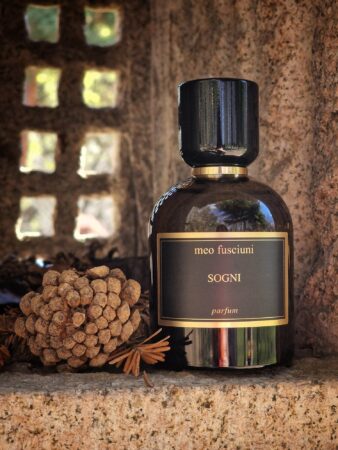
Meo Fusciuni Sogni, photo by Nicoleta ©
Thirteen years ago, Meo Fusciuni embarked on an olfactory research project that combined perfumery, herbalism, and botany, for a fragrant alchemy that has just added a new stop in its journey: Sogni – the perfume that will close the Timeless Trilogy. La Trilogia Senza Tempo began with Varanasi, a sacred and profane place of smell, full of contrast and meanings, inspired by a journey into India, born from the the visceral emotion Meo felt at the sacred waters of the Ganges; then he captured the treasured memories of Laos – born from a moment in which petals fell into a cup of tea, a transparent veil of hope and sublimated joy in Encore du temps.
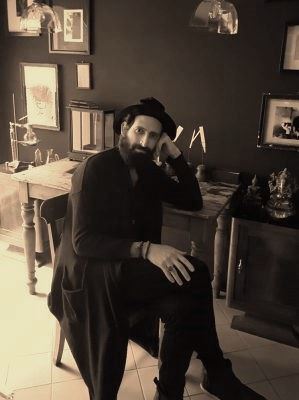
Meo Fusciuni’s given name is Giuseppe Imprezzabile photo colorized by Michelyn from a photo by Contributor Danu Seith-Fyr©
“With Sogni I told of my love for Japan, my memories of past travels, my passion for Kawabata’s literature, Kurosawa’s films, and bonsai trees. I tried to tell a new story with a warm woody perfume, my Japanese dream. One day, a long time ago, I thought or dreamed of being able to create a perfect woody perfume, where the different woods would tell the story of time, of the passing of life itself, again a challenge, a perfume that could be unique, exciting, and involving. Sogni is the realization of my desire, an immediate experience, incredibly close to reality and the nature of things. Aesthetic devotion to nature. A journey into the beauty of the Japanese harmony” – Meo Fusciuni, 2023
If writing about music is like dancing about architecture, then, maybe, writing about perfume is like trying to capture the essence of a dream in words. A dream you are given a glimpse of, through an ephemeral window. Sogni (dreams) opened up a dream of Japan and I stepped in. And for a second there I am, morphed into Shimamura, my finger drawing a secret window to somebody else’s dreams.
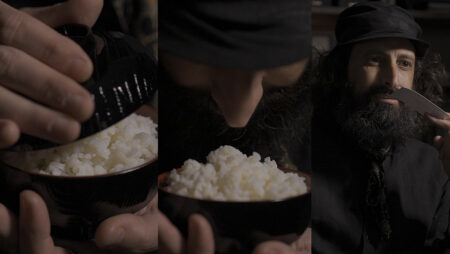
collage for Meo Fusciuni Songi with official images from the brand by Nicoleta©
“But he had been dreaming, and when he came to himself he saw that it was only the reflection in the window of the girl opposite. Outside it was growing dark, and the lights had been turned on in the train, transforming the window into a mirror. In the depths of the mirror, the evening landscape moved by, the mirror and the reflected figures like motion pictures superimposed one on the other. The figures and the background were unrelated, and yet the figures, transparent and intangible, and the background, dim in the gathering darkness, melted together into a sort of symbolic world, not of this world. Particularly when a light out in the mountains shone in the center of the girl’s face, Shimamura felt his chest rise at the inexpressible beauty of it. The mountain sky still carried traces of evening red. Individual shapes were clearly far into the distance, but the monotonous mountain landscape, undistinguished for mile after mile, seemed all the more undistinguished for having lost its last traces of color. There was nothing in it to catch the eye, and it seemed to flow along in a wide, unformed emotion. That was of course because the girl’s face was floating over it. Cut off by the face, the evening landscape moved steadily by around its outlines. The face too seemed transparent—but was it really transparent?” Snow Country – Yasunari Kawabata
Images move before my eyes, like clouds hovering above the sun, felt – not seen through the closed eyelids. Through the window, in fast succession, a forest dances. Branches of green trees move in the wind like green waters before a sea storm, arms slowly stretching, green lungs breathing in the cool vegetal scent. It feels resinous, camphorous, aromatic, and blunt, the kind of deep green one can smell only after heavy rain.
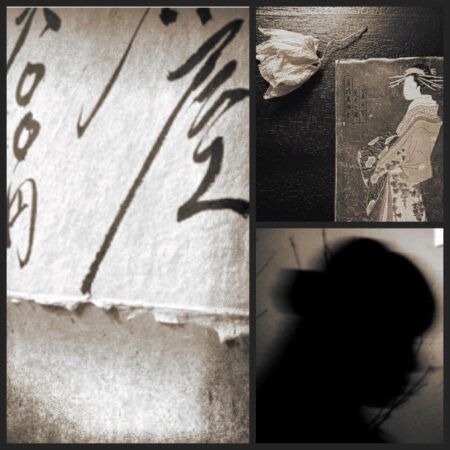
Meo Fusciuni Sogni, collage with official images from the brand by Nicoleta
Through the bamboo,
the wind of summer,
you’ll be here next year. -Meo Fusciuni
Soon after, we move to the beige woody cocoon of a ryokan, away from the rain, in a quiet room, suspended in time, in complete stillness. There is no time outside of time in this dream, for time has folded upon itself, like a Tatami mat that covers and muffles any step. Smells of frozen time, dried hay, aged straw mats, and eternity.
Outside, a light green forest with thin, tall, transparent green bamboo trees, with a narrow path of rain-drenched earth drawing the traveler into an imponderable labyrinth. The path narrows and rounds at the edges, with a white foggy white milky promise drawing near. It’s now almost sweet, almost round, like inhaling a pure, simple joy: a warm steaming bowl of rice.
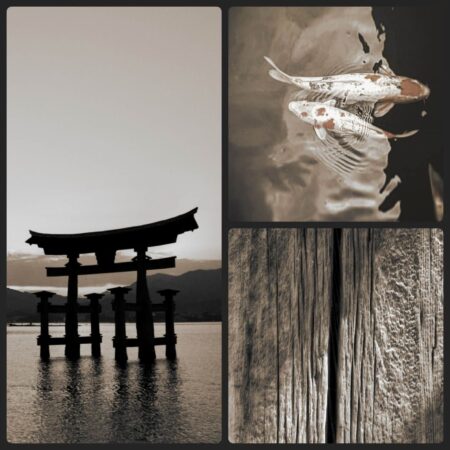
Meo Fusciuni Sogni, collage with official images from the brand
The Kodo ritual* can begin. Placed in the ashes, the wood chips start to mingle their smoke in the evening air, raising in complete stillness and silence. Listen* to it – it’s whispered and sweet, now it tells of long forgotten bitter secrets, and soon it will turn silky, like a peony petal-turned-to- robe embracing the skin. The laws of physics have been halted and you can move your hands, freely, through the nervures of the wood.
Slow steps along the way,
I trample leaves now red.
Time, I thought was over
I light incense. –Meo Fusciuni
* Kōdō, translated as “way of the fragrance” is the art of appreciating Japanese incense, being one of the three classical Japanese arts of refinement, along with kadō/ ikebana for flower arrangement, and chadō/sadō for the tea ceremony. Kōdō includes all aspects of the incense process, from the tools (香道具, kōdōgu), to activities such as the incense-comparing games kumikō (組香) and genjikō (源氏香). The participants don’t “smell” (the Japanese verb ‘kagu‘) the incense or fragrant wood, but rather “listen” (kiku) to it, opening up not so much their “nose” but their heart and spirit, being transported to a different spiritual plane.
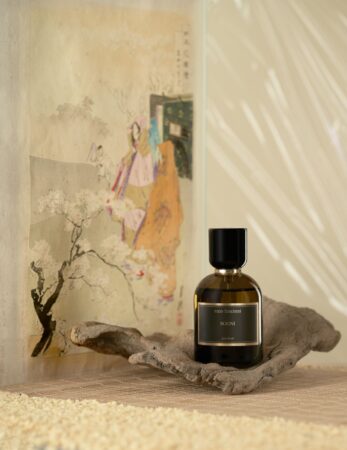
Meo Fusciuni Sogni, official photo
Meo prefers to be called “aromatorio”, not a nose or perfumer, with a term coming from old apothecaries of the past, describing a person who had herbal knowledge and the right way to use spices and medicinal plants. In Sogni, we have the alchemical recipe for deconstructing a dream, and re-building it, using DNA sequences of plants interwoven with REM frames from a world built from memories, for a result that is poetic, cohesive, and one of the most beautiful fragrant homages to the essence of Japan.
Also read: Meo Fusciuni: Narcotico, L’Oblio, Encore du Temps, Varanasi, Spirito, Little Song
Meo’s note: Sogni was conceived, created, and arranged, listening at each of these stages to the album Async by Ryuichi Sakamoto and reading the works of Y. Kawabata.
Olfactory family: Woody; Facet: Floral, gourmand, incense, amber
Fragrance notes: Tatami, Pine Needles, Rice Absolute, Peony, Bamboo, Kodo ritual, Cedarwood, Sandalwood, Oakwood, Roasted Green Tea, Tobacco, Guaiac Wood, Incense, Vetiver, Musk, Amber
Disclosure: The bottle was kindly offered by Meo Fuscini. As always, my opinions are my own.
Nicoleta Tomsa, Senior Editor
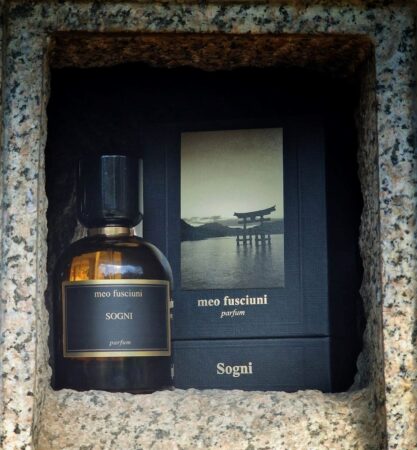
Meo Fusciuni Sogni by Nicoleta©
Thanks to the generosity of Meo Fusciuni we have 100 ml of Sogni for one registered reader in the EU, UK, USA or Canada. You must register or your entry will not count. To be eligible, please leave a QUALITY comment saying what sparks your interest based on Nicoleta’s essay and review of Meo Fusciuni Sogni and where you live. Do you have a favorite from Meo Fusciuni? Draw closes 3/23/2023
Please join Meo and the team at 7Scents.hu on the 20th March at 18:30 CET on the @7scents_hu Instagram profile to hear Meo talk about Sogni.
Follow us on Instagram @cafleurebonofficial @nicoleta.tomsa @meofusciuni_parfums
This is our Privacy and Draw Rules Policy
We announce the winners only on our site and on our Facebook page, so like ÇaFleureBon and use our blog feed… or your dream prize will be just spilled perfume
Like our Facebook page: Çafleurebon and use our blog feed for new updates and articles
